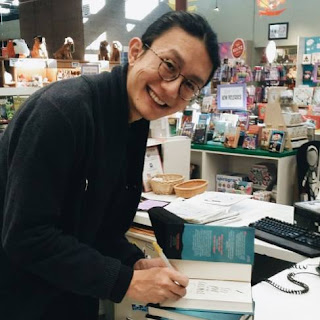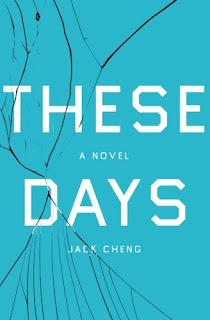A few months ago I received a message from Jack Cheng. He found my book at Pages Bookshop in Detroit and wanted to tell me how much the story resonated with him. I was delighted that he took the time to reach out.
I discovered that he lived nearby in Detroit, grew up in Troy, and his first middle grade novel was about to be published. I loved the premise of the story and wanted to know more. He's had all kinds of interesting experiences like living in a yurt, but I'll save those stories for a time when you meet him in person. He recently joined SCBWI-MI, so hopefully we'll see him at one of our events soon. Until then, here's a brief introduction:
KL: Your middle grade novel, See You in the Cosmos, is off to a great start with starred reviews from Kirkus and Publisher’s Weekly. Congrats! Tell us a little about the story and where your ideas came from.
JC: Thanks! The story’s about Alex, an eleven-year-old trying to launch his iPod into space. Alex’s father passed away when he was three, and there’s something mysterious and not quite right about his mother’s role in his life. He also has an older brother living in another state and a dog named Carl Sagan, after his hero—the real-life astronomer. Alex embarks on this mission of his, I think, as a way of trying to understand—and cope with—everything that is happening in his life.
I had the idea for the story when I was back at my parents’ house over Thanksgiving, in 2012. I was hanging out in my younger brother’s room and saw that he had a copy of Carl Sagan’s Pale Blue Dot, and remembered an episode of the NPR show Radiolab that I’d heard years before, in which Sagan’s widow Ann Druyan talked about how the two fell in love as they worked to gather sounds for the Voyager Golden Record. When I woke up the next morning, the basic premise just popped into my head: A boy and his dog; an iPod bound for space.
I had the idea for the story when I was back at my parents’ house over Thanksgiving, in 2012. I was hanging out in my younger brother’s room and saw that he had a copy of Carl Sagan’s Pale Blue Dot, and remembered an episode of the NPR show Radiolab that I’d heard years before, in which Sagan’s widow Ann Druyan talked about how the two fell in love as they worked to gather sounds for the Voyager Golden Record. When I woke up the next morning, the basic premise just popped into my head: A boy and his dog; an iPod bound for space.
See You in the Cosmos is your first novel for kids, but you’ve already had some experience in the adult literary world. Tell us more.
I self-published my first novel, These Days, in 2013. I was living in New York and working in tech at the time (I’ve since moved back to Michigan where I grew up, and currently live in Detroit). These Days originated from a daily journaling practice, and after a couple years working on it in my spare time I found that I enjoyed writing so much that I’d rather do that than stay at my day job. I sent the manuscript around to agents but wasn’t getting much of a response, and I decided, You know what, this is my first novel and I plan to write more; I’m going to self-publish it and treat the whole thing as a learning experience—as a way to understand how to write and publish a novel, from start to finish. I successfully funded a Kickstarter campaign and did a small print run of 650 hardcovers.
Who is your agent and how did you connect with him/her?
My agent is Jessica Craig, and she’s based in Barcelona. We actually connected because of the funding campaign for my first book. These Days was featured in the Kickstarter weekly newsletter and caught Jessica's eye, and she reached out asking to read the manuscript. I interviewed Jessica about it for a podcast I’ve been doing about the making See You in the Cosmos, so if you’re interested, you can hear more of the backstory here.
How have your experiences differed between self-publishing vs traditional publishing, and adult vs children’s writing/publishing?
Self-publishing was a very solitary experience for me, even though I did hire freelance editors and copyeditors for the book. One thing that’s really surprised me about traditional publishing is the sheer number of people involved in making a book and getting it out into the hands of readers. I think, also, everyone at every stage is much more invested in the project; they kind of have to be to want to publish it in the first place. And because of everyone involved, it ends up being a slower process than self-publishing, but there also an intentionality behind all the steps. My friend Robin Sloan, who has also both self-published a book and had one published traditionally, describes the latter as deliberate. I think that’s the perfect word.
As for adult vs children’s, I didn’t start out writing this book as a children’s book. I didn’t even know there was a category called Middle Grade at the time; I was more trying to tell a story about Alex and the other characters. Once the book was acquired (jointly by Dial in the US and Puffin in the UK) a lot of the work I did with my editors was to make it more squarely for young readers, and move some of the adult themes and issues more into the background. That way, the story would work primarily for kids but still retain that depth and richness for adults.
I found it to be a really interesting challenge because it forced me to know my material and the characters better in some ways—to be able to express these perhaps-more-complex adult concepts in a manner that wouldn’t go over the head of a ten-year-old. It reminds me of what the physicist Richard Feynman said about teaching—that if you can't explain a subject in plain English, then maybe you yourself don't understand it well enough. I think there’s something akin to that happening here, too.
What’s next for you?
In the immediate term I’m visiting schools across the country to talk with students and meet with booksellers and librarians, and after I come back from tour I’m going to begin work in earnest on the next book. A few things I know at this point: it’ll take place in Detroit and its suburbs; it’ll once again be for young readers; and it’ll be more directly about my experience as a Chinese American.
My identity as a Chinese American is an area of my own life that I’ve just begun to explore recently, and I’ve come to see fiction-writing as one of the best vehicles for this kind of self-examination.
Fun fact: Jack's book launch party at Pages Bookshop was on Fat Tuesday, otherwise known as Paczki Day, and he had spaced- themed jelly donuts! This picture does not do them justice; they were quite delectable in person. 😋
Thanks, Jack!
Coming up on the Mitten blog: Nina Goebel is coordinating with our new Featured Illustrator. We'll introduce her and unveil our new blog banner soon. Plus, more Michigan KidLit Advocates, a Writer's Toolbox, an interview with a publicist, and another Writer's Spotlight - it could be you!
Have a great weekend!
Kristin Lenz






Fun! And timely. I will be moderating at panel that will include Jack at Nicola's books during Children's Book Week. It's May 3rd at 7pm and also includes our own Jean Alicia Elster and Ruth Behar who has a new kids book out. Please join me to hear more from Jack!
ReplyDeleteShutta
Welcome to the Michigan writing community, Jack. Thanks for sharing your story's story with us.
ReplyDeleteSo happy to learn more about you, Jack! Congratulations and welcome!
ReplyDelete